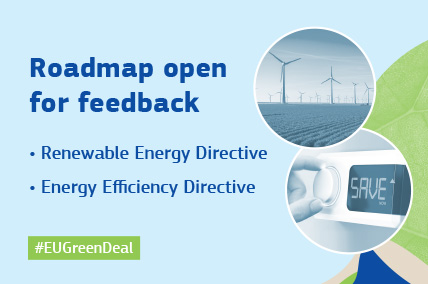This website uses cookies so that we can provide you with the best user experience possible. Cookie information is stored in your browser and performs functions such as recognising you when you return to our website and helping our team to understand which sections of the website you find most interesting and useful.
Commission launches the review of renewables and energy efficiency directives
With the aim to reduce greenhouse gas emissions by at least 50% and towards 55% in a responsible way by 2030, the EU Green Deal communication has identified a series of climate, energy and environmental legislation that needs to be reviewed.

To achieve EU Green Deal’s ambition, the Commission has published roadmaps for the review of two directives. Both the Renewable Energy Directive (2018/2001/EU) and the Energy Efficiency Directive (2012/27/EU and 2018/2002/EU) are among the instruments that are assessed. The Commission aims to inform stakeholders and citizens of what the goals of this initiative are and which policy options are being considered.
The consultation will be opened during a seven-week period (3 August – 21 September) for public feedback on the concept.
The roadmaps should complement the comprehensive impact assessment that is being carried on the Climate Target Plan for 2030 and the work that is being carried on the emissions trading system directive; the effort sharing regulation, the land use, the land use change and forestry regulation and the CO2 emissions performance standards for cars and vans. It is foreseen to present the result of the review and possible proposals in June 2021.
Renewable Energy Directive
For renewables, the roadmap is in the form of an inception impact assessment. It will assess whether the EU renewable energy target should be raised and whether other parts of the directive would need to be modified, in line with the ongoing assessment underpinning the Climate Target Plan for 2030 and other initiatives already adopted as the Biodiversity Strategy, the Energy System Integration Strategy and the Hydrogen Strategy, as well as Member State national energy and climate plans.
Energy Efficiency Directive
For energy efficiency, a combined evaluation roadmap and inception impact assessment is foreseen. The evaluation will review the adequacy of the directive in view of the existing energy efficiency targets, policies and measures set out in the national energy and climate plans. It will take into account the higher climate target and recent Commission initiatives such as the Energy System Integration Strategy. The findings of the evaluation will provide insights into the remaining economic, environmental, behavioural and organisational barriers, which will help identify additional solutions for improving the energy efficiency framework.



